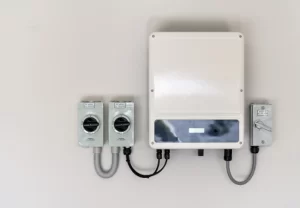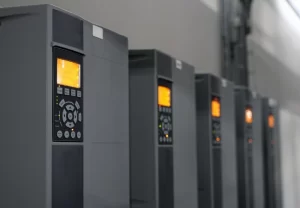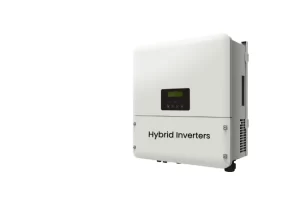Table of Contents
Daylight-based energy is turning into an unavoidably popular decision for driving homes and associations. As extra people go to this harmless ecosystem power source, understanding the parts that make up a sun-situated power system becomes imperative. One of the most fundamental pieces of a sun-situated power system is the inverter, which changes the prompt stream (DC) power made by daylight-based chargers into trading stream (AC) power that can be used by home gadgets or dealt with in the electrical organization.
There are a couple of sorts of daylight-based inverters, each with its advantages and shortcomings. This article will focus in on three chief sorts: on-the-web, Offline, and hybrid inverters. By understanding the differentiations between these inverters, you can make an informed decision about which one is fitting for your sun-controlled energy system.
Online Inverters
Online inverters, otherwise called framework-tied or network-associated inverters, are intended to work paired with the electrical lattice. These inverters convert the DC power created by sunlight-based chargers into AC power and feed it straightforwardly into the framework. On the off chance that your sunlight-based chargers produce more power than your home or business utilizes, the overabundance of energy is shipped off the lattice, and you might get a credit on your service bill through an interaction called net metering.

Benefits of Online Inverters
- Productivity: Online inverters are profoundly proficient, as they just have to change DC over completely to AC. This outcome in negligible energy misfortune, making them a fantastic decision for augmenting the result of your planetary group.
- Practical: Since online inverters don’t need batteries for energy capacity, the general expense of the nearby planet group is lower. Furthermore, with net metering, you can counterbalance the cost of your power use by taking care of the overabundance of energy back into the lattice.
- Effortlessness: These inverters are moderately easy to introduce and keep up with, making them a well-known decision for private and business sun-based establishments.
- Adaptability: Online inverters can be effectively scaled to oblige bigger frameworks, making them appropriate for both little private arrangements and enormous business establishments.
Inconveniences of Online Inverters
- Matrix Reliance: The essential disadvantage of online inverters is that they depend on the electrical framework to work. During a blackout, the inverter will naturally close down to forestall taking care of power into the framework, which could imperil utility laborers. This implies that your planetary group won’t give power during a power outage except if you have a reinforcement power source.
- No Reinforcement Power: Since online inverters don’t store energy, they can’t give power during periods when the sunlight-based chargers are not creating power, for example, around evening time or during the overcast climate.
Offline Inverters
Offline inverters, generally canceled free or arranged inverters, are expected for systems that are not related to the electrical network. These inverters are for the most part used in far-off locales where permission to the cross section is confined or difficult to reach. Offline inverters are coordinated with battery limit structures, which store the overflow of energy delivered by the sun-controlled chargers for use when the sun isn’t shimmering.

Benefits of Offline Inverters
- Freedom: Offline inverters permit you to accomplish total energy autonomy. Since they are not associated with the network, you are not exposed to utility rates or blackouts.
- Reinforcement Power: With a battery stockpiling framework, offline inverters can give power during periods when the sunlight-based chargers are not producing power. This makes them an ideal decision for distant areas or regions inclined to visit blackouts.
- Adjustable: Offline inverters can be modified to meet the particular energy needs of your home or business. You can pick the size of the battery stockpiling framework and the limit of the inverter to match your energy utilization.
- Unwavering quality: In regions where the electrical matrix is temperamental or nonexistent, offline inverters give a predictable and dependable wellspring of force.
Drawbacks of Offline Inverters
- Greater expense: The requirement for a battery stockpiling framework makes offline inverters more costly than their internet-based partners. The underlying speculation is higher, and batteries should be supplanted intermittently, adding to the drawn-out costs.
- Complex Establishment: Introducing an offline inverter framework is more intricate and may require particular mastery. Appropriate measuring of the battery stockpiling and cautious framework configuration is fundamental to guarantee that your energy needs are met.
- Energy Efficiency: Offline inverters may be less energy capable than online inverters as a result of the energy incidents connected with charging and delivering batteries. Also, in case the system isn’t true to form estimated, there may be seasons of overflow energy creation that can’t be taken care of.
Hybrid Inverters
Hybrid inverters, as the name proposes, solidify the components of both on-the-web and Offline inverters. These versatile inverters can be related to the grid, be that as it may, they similarly can store a wealth of energy in batteries. Hybrid inverters give the most ideal situation, offering network accessibility with the extra benefit of battery storage for support power.

Benefits of Hybrid Inverters
- Adaptability: Hybrid inverters offer adaptability by the way you use and deal with your sun-powered energy. You can decide to focus on self-utilization, store energy for some time in the future, or feed an overabundance of energy into the lattice. This adaptability permits you to improve your energy use and possibly lessen your service bills.
- Reinforcement Power: Like offline inverters, crossover inverters give reinforcement power during lattice blackouts. The battery stockpiling framework guarantees that you have a solid wellspring of force in any event when the matrix is down.
- Energy Freedom: While crossover inverters are associated with the matrix, they permit you to lessen your dependence on the service organization. By putting away an overabundance of energy, you can limit how much power you want to buy from the lattice, particularly during busy times when rates are higher.
- Brilliant Innovation: Numerous half-breed inverters accompany savvy innovation that permits you to screen and deal with your energy use progressively. This can assist you with settling on informed conclusions about when to utilize put-away energy when to sell an overabundance of energy back to the matrix, and how to boost your framework’s proficiency.
- Net Metering Advantages: Half-breed inverters permit you to exploit net metering, giving a monetary motivating force to take care of the overabundance of energy in the matrix.
Disadvantages of Hybrid Inverters
- Greater expense: Hybrid inverters are by and large more costly than online inverters because of the additional intricacy of the battery mix. Nonetheless, the drawn-out reserve funds from decreased energy bills and reinforcement power capacity can balance the underlying venture.
- Complex Establishment: Introducing a hybrid inverter framework is more perplexing than a straightforward lattice-tied framework. It requires cautious preparation and planning to guarantee that the battery stockpiling and inverter limit are appropriately estimated for your necessities.
- Support: Half-breed frameworks might require more upkeep than online frameworks because of the presence of batteries. Customary observing and potential battery substitutions add to the upkeep costs.
Which Inverter is Suitable for You?
Picking the right kind of sun-situated inverter depends upon your specific energy needs, region, spending plan, and tendencies.
- Online Inverters: If you live in a space with a strong electrical grid and need to restrict your candid costs, an electronic inverter may be the best choice. It’s capable, commonsense, and ideal for people who need to take advantage of net metering.
- Offline Inverters: If you live in a distant district or need an outenergy opportunity, a Offline inverter is the best methodology. While it goes with a higher beginning cost, it offers trustworthiness and support power in districts where the grid is unavailable or dishonest.
- Half-breed Inverters: If you want the most intelligent situation possible, a combination inverter offers the versatility, support power, and energy opportunity that various property holders and associations search for. While it requires a greater hypothesis, the long advantages make it a persuading decision.
All things considered, understanding the qualifications between on-the-web, Offline, and mixture inverters is important in going with an informed decision for your sun-arranged energy structure. Each type partakes in its uncommon advantages and reasonable disservices, notwithstanding, by circumspectly considering your energy needs and goals, you can pick the inverter that best suits what is happening and helps you with outfitting the greatest limit of sun-based power.
As a leading solar system supplier, BTLME offers different types of top-notch solar inverters. At BTLME, we only partner with trusted and reputable brands. BTLME is committed to delivering reliable, efficient, and cost-effective solar solutions. We have a strong presence in the UAE, India, Qatar, Saudi Arabia, the UK, Djibouti, and Bahrain.
